GBCI 2022: Entity management and business complexity

TMF Group’s Global Business Complexity Index 2022 explores 292 different indicators relating to business complexity. Our analysis covers three core areas of business administration, and ultimately assigns an overall complexity score to each of the jurisdictions assessed.
This article focuses on the third and final key area of business: global entity management. Here we take a closer look at some of the findings from this year’s Global Business Complexity Index (GBCI), along with commentary from our subject matter experts.
We will take a chronological look at the challenges companies face when setting up a legal entity, operating within, and withdrawing from a foreign jurisdiction.
Currently the major drivers of increased complexity include the introduction of new legislation (principally focused on regulation), enhanced reporting requirements and increasing levels of stringency, such as the tightening of deadlines. We will also consider how Covid-19 has impacted the practice, looking at examples where the pandemic has halted incorporation, alongside jurisdictions which have rapidly adapted through digitalisation and streamlined operating processes.
When Covid-19 first hit we saw an initial freeze on business expansion and a slowdown in the establishment of new entities. When businesses were ready to resume their expansion plans, they generally found that the process of incorporating took a lot longer. The pandemic has also had a negative impact on interest in new entity arrangements, as many want to see the dust settle on the ‘new normal’ before committing to decisions.
Incorporation takes around a month on average
Today, at a global level, it takes on average around a month for a private company to be incorporated. Regionally, incorporation times are longest in South American jurisdictions. For example, in Venezuela, Guatemala, and the Dominican Republic it typically takes more than three months to incorporate a private company. In EMEA, the process is much faster, taking less than a month on average.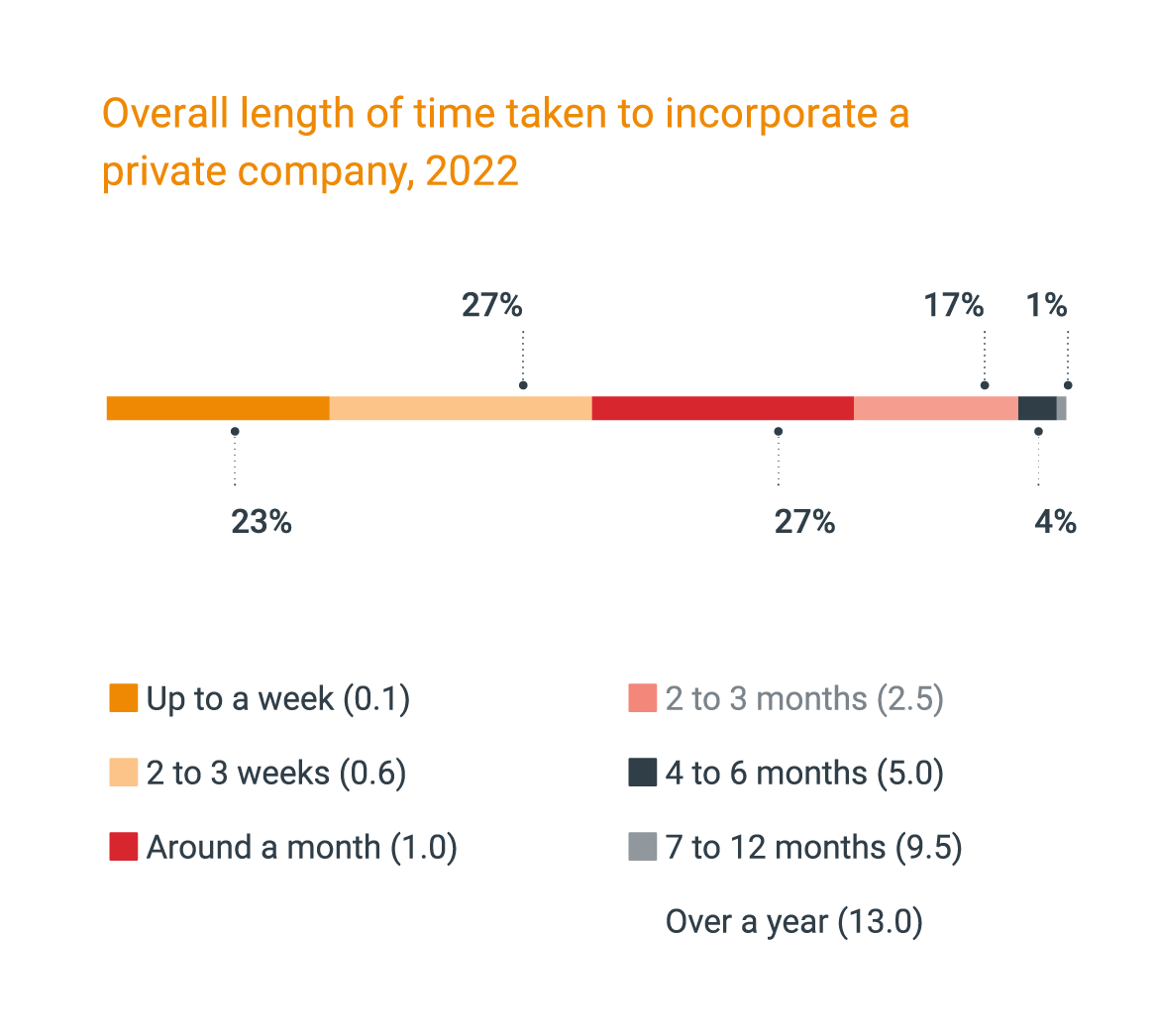
Opening a bank account from abroad can delay operational readiness
For foreign companies, the procedure of opening a bank account can add significant delays to operational readiness. This can take longer in countries aligned with the EU anti-money laundering directives, as the stringent regulations require additional documentation which can take time to gather and verify. In countries like Italy some of this documentation must be presented in person, and the backlog caused by the pandemic means appointment lead times are at an all-time high.
The average time taken to open a bank account from abroad is increasing. In 2020, this process took over a month in just 35% of jurisdictions. This rose to 43% in 2021, and now stands at 55%. Waiting over a month to open a business bank account adds a significant delay to starting operations.
Regionally, opening a bank account from abroad takes significantly longer in North America and EMEA, while it’s still quickest in South America, despite a doubling in the percentage of jurisdictions where this takes more than a month, from 2020 to 2022.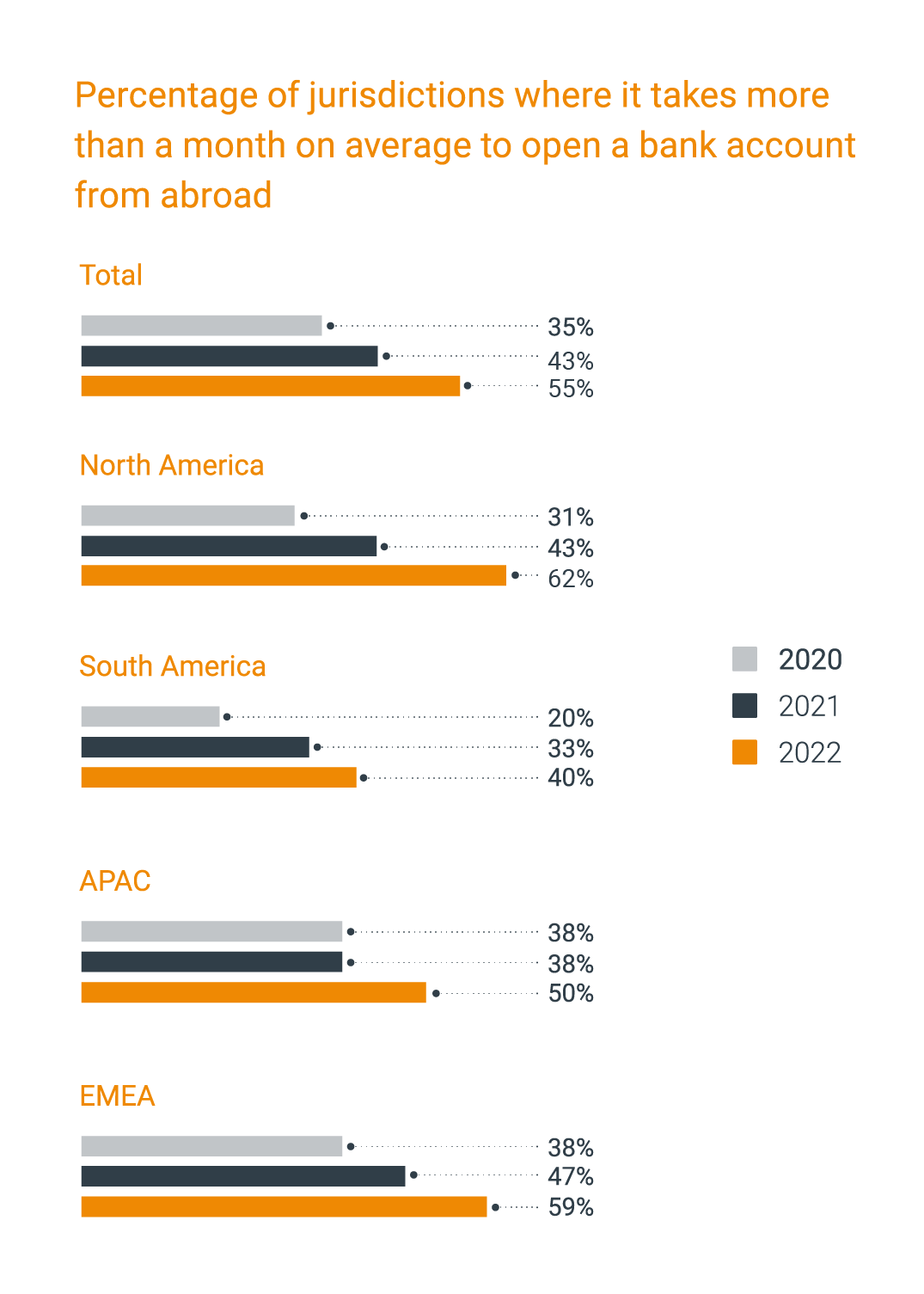
New compliance requirements make ongoing operations more challenging
There has been a steady increase in new compliance-related legislation, making ongoing operations more challenging. In OECD countries transparency requirements continue to increase, with layers of anti-corruption or anti-tax evasion legislation. Governing bodies are also becoming more rigorous around how quickly businesses must file documentation, or the depth of information that must be provided.
Stricter requirements include the need for qualified individuals to prepare corporate changes or statutory submissions to local authorities, on behalf of the legal entity. This was required in 37% of jurisdictions in 2020, rising to 45% in 2021, and 48% in 2022. In BVI, for example, companies are required to appoint a registered agent to handle legalities. With this increased stringency comes higher accountability, with the use of qualified individuals meaning authorities can impose fines or other punishments if submissions are then deemed to be incorrect or incomplete.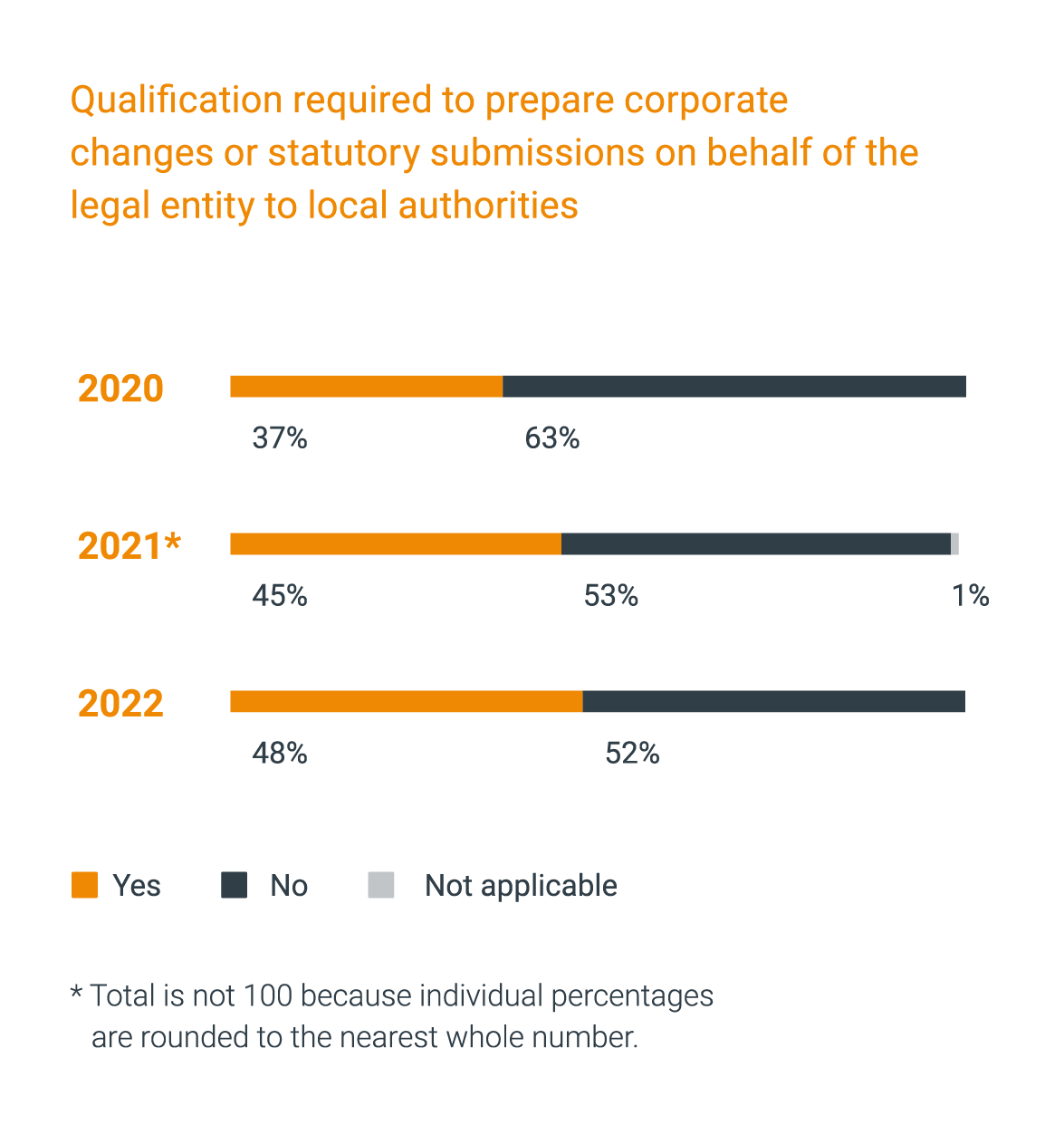
Personal liability of directors is on the rise
Directors of private companies are also being held increasingly liable. Over the last three years, personal liability has steadily increased from 86% of jurisdictions in 2020, to 88% in 2021, and 92% this year.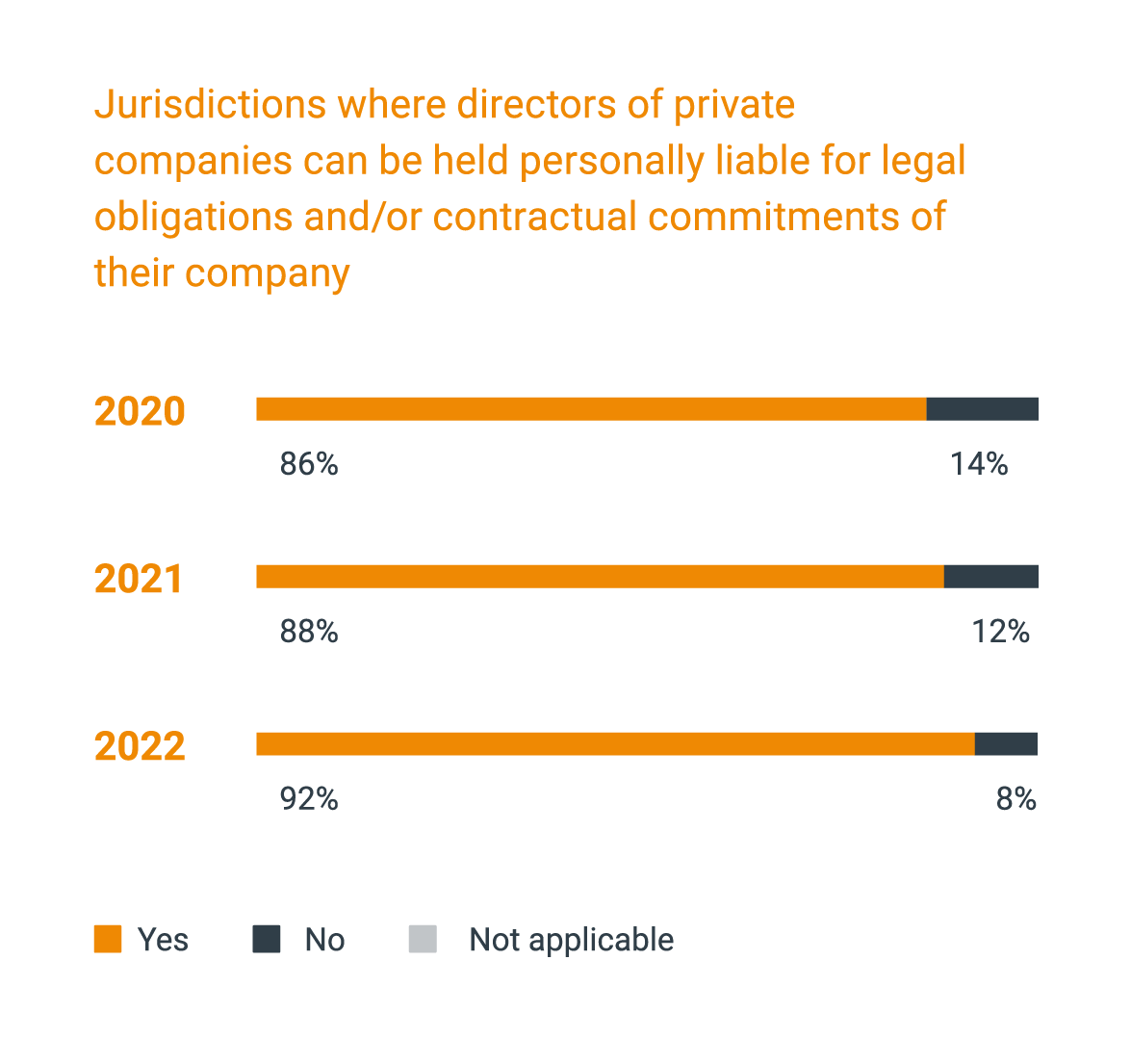
Yet India has taken an alternative approach, waiving personal director liability. It takes the view that removing these punishments will promote higher transparency
Approach to Covid-19 polarises jurisdictions
Covid-19 has been hugely disruptive to global entity management processes since early 2020, and jurisdictions have tended to go in one of two directions. On the one hand, some have moved to a more digitalised and streamlined delivery model. Some old-fashioned practices may have been removed, replaced, or relaxed. In Canada, for example, requirements have been relaxed around formalities such as wet signatures on legal documents, either because people were in lockdown or don’t have access to printers at home. In favour, we have seen the growing acceptance of documents being transmitted electronically. So, in effect, the pandemic has caused some processes to take less time, having been simplified through the power of accelerated digitalisation.
On the other hand, some jurisdictions aren’t as well set up to lean on digital processes, or are less open to making this shift. As such, processes have been significantly delayed as physical offices were closed for periods of time or were operating with a reduced workforce. For example, in Mexico the timeframes for appointments with registrars increased exponentially during the height of the pandemic. Those jurisdictions that fall into this camp are still suffering the ongoing effects of delays.
The legal world is one of the last bastions to hold out on embracing digitalisation, being very attached to paper, wet signatures, chops and seals. It is likely that the pandemic will serve to highlight to governments and legal bodies that business continued to be carried out without these formal requirements. Digital practices brought about through necessity during the pandemic are likely to be here to stay, as they continue to make processes easier.
Dissolution processes are also taking longer
The time taken for the dissolution of a company has continued to increase, taking more than seven months on average in 2022, having increased year on year since 2020. Breaking this down by region, average dissolution times are longest in South America (9.3 months) and APAC (8.8 months), while the process takes just over six months in North America and EMEA.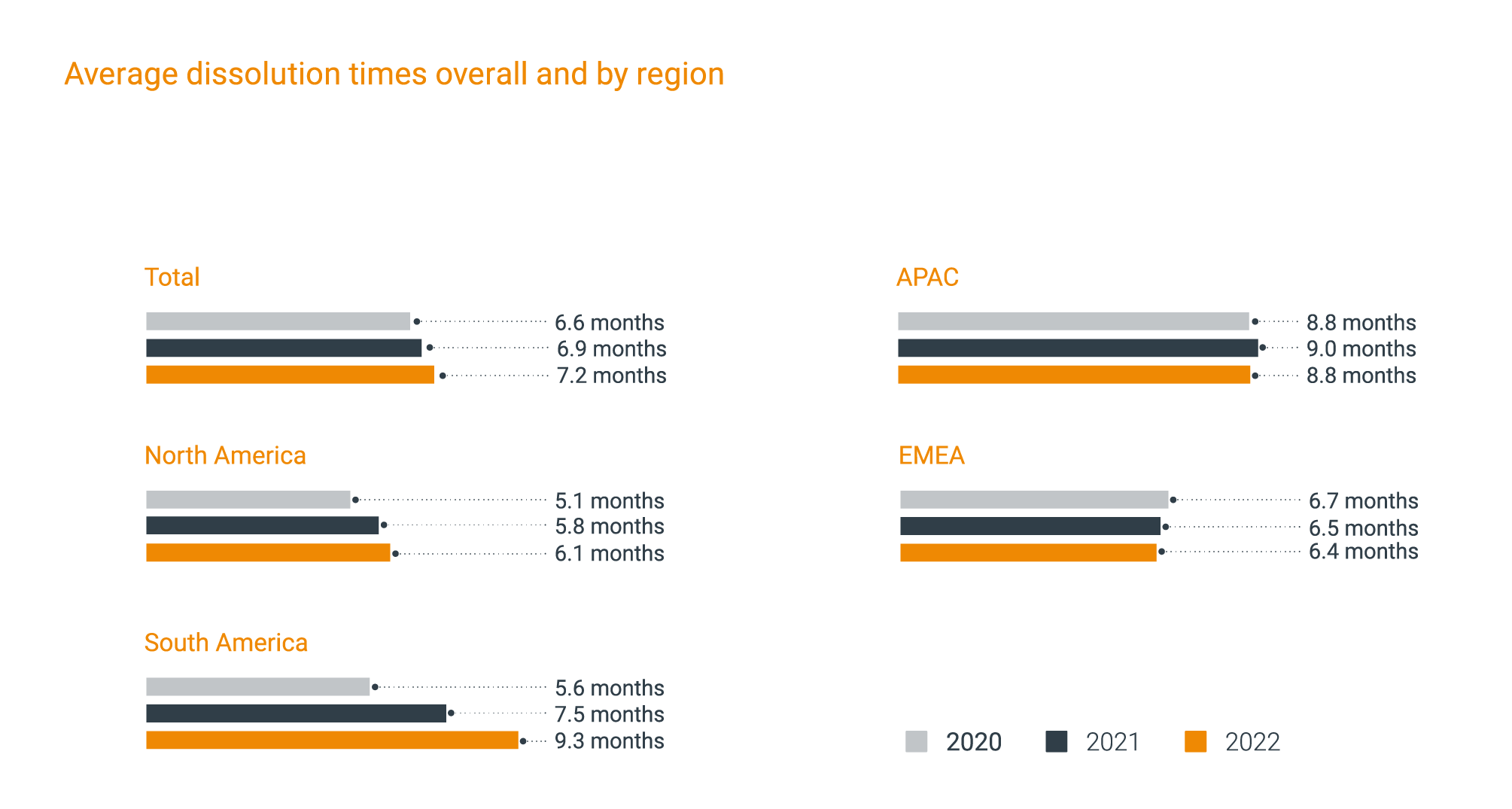
In summary, the pandemic brought new incorporations to a halt in many jurisdictions. When businesses were ready to resume expansion, the process of entity establishment and opening bank accounts generally took much longer. While some jurisdictions faced a huge backlog and reduced capacity at the relevant authorities, others embraced the process of digitalisation and, as such, now have a new competitive advantage. Alongside this polarisation, we have seen other factors at play, including new regulations and the increased stringency of requirements. The pandemic is not yet over, and we will continue to see the incorporation and operational landscape evolve over the coming years.
The Global Business Complexity Index
The GBCI 2022 provides an authoritative overview of the complexity of establishing and operating businesses around the world. It explores factors driving the success or failure of international business, with a focus on operating in foreign markets, and outlines key themes emerging globally as well as local intricacies across 77 jurisdictions.
Explore the GBCI rankings, analysis and global trends to help you find your path to growth, amid the complexity of corporate compliance.
To download and read the report in full, visit the Global Business Complexity Hub today.
To find out more about the drivers of business complexity in the jurisdictions that matter to you, why not explore our Complexity Insights Dashboard?





